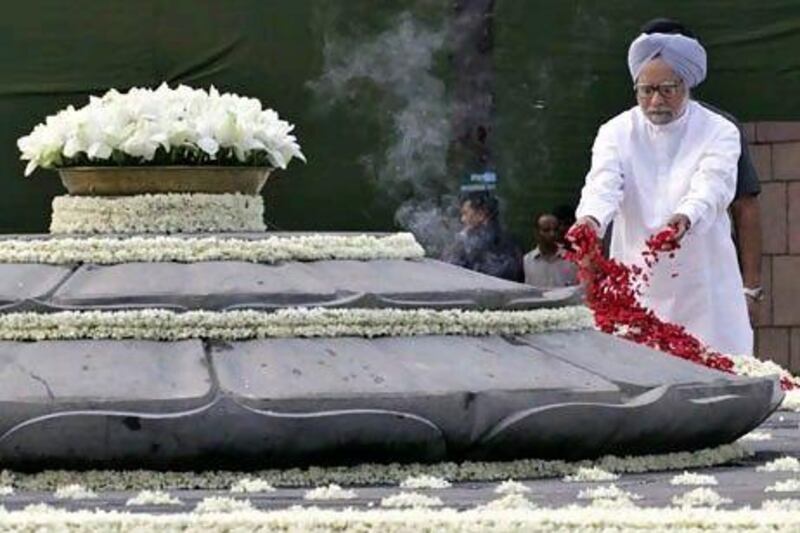NEW DELHI // India's prime minister will attend a summit in Tehran next week, further signalling his intent to maintain ties with Iran, despite pressure from the United States to limit contact.
Manmohan Singh will attend the meeting of the Non-Aligned Movement (Nam), a group of 120 countries set up during the Cold War that do not consider themselves aligned formally with any major power block. The last Indian prime minister to visit Iran was Atal Behari Vajpayee in 2001.
The United States has been trying to persuade India to reduce its ties with Iran and, in particular, cut back on its imports of Iranian oil to increase international pressure on Iran to abandon its nuclear programme.
But India has stressed that its foreign policy on Iran would be guided only by its own principles.
In March, a statement from the Indian embassy in Washington said that "India's relationship with Iran is neither inconsistent with non-proliferation objectives, nor do we seek to contradict the relationships we have with … the United States and Europe."
It urged its allies to "give diplomacy a fair chance" and supported Iran's right to peaceful uses of nuclear energy.
In public, the United States has been careful about being too critical of India's relationship with Iran.
Last week, Victoria Nuland, a US state department spokesperson, told reporters that the United States hoped, "as we always do when our partners and allies are involved in any kind of intersection with Iran, that the larger points are made about the importance of Iran coming back into compliance with its international obligations."
Mr Singh's persistence in maintaining ties and his visit to Tehran are bold diplomatic moves, said Sushant K Singh, a fellow at the Takshashila Institution, a Chennai-based think tank.
The strategy is an attempt "to publicly avoid being seen in lockstep with the US on Iran … There is a strong political constituency in India to show that India is not under the US thumb, and there's nothing better than this gesture to show it", Mr Singh said yesterday.
Hillary Clinton, the US secretary of state, visited New Delhi in May to try to persuade India to slash Iranian oil imports. India acquiesced, in part. It plans to reduce the amount of oil it imports from Iran to 15.5 million tonnes in 2012-12, down from 18.5 million tonnes in 2010-11.
Energy considerations are also driving India's diplomatic strategy. Even after cutting back on imports of Iranian oil, Iran is India's fourth-largest supplier of crude, behind Saudi Arabia, Iraq and Kuwait.
India has received a special waiver from international sanctions on Iranian oil. Last week, the Indian tanker, MT Omvati Prem, left Iran with 85,000 tonnes of oil, the first such Indian ship to do so after European Union sanctions kicked in last month.
India also pays for up to nearly half its imports in rupees, which Iran can then use to purchase wheat, medicines and rice - commodities that do not fall under the sanction net.
B N Bankapur, the former director of refineries at the state-owned Indian Oil Corporation, said India could afford to slash Iranian imports further, even though it was choosing not to do so.
"The imports cut from Iran can be made up from plenty of other countries," Mr Bankapur said. The character of Iran's crude "is not very different from other Middle Eastern crudes. In any case, Indian refineries are capable of processing most types of crude now".
India's stance on Iran was also something of a hedge, Mr Singh, of the Chennai-based think tank, said.
Through the Arab Spring, India purposely refrained from taking unequivocal positions on the developments in the Middle East.
"India believes that after the current period of turmoil, Iran has a good chance of emerging as the winner in the region," Mr Singh said. "New Delhi is also not sure whether, in the next administration, the US will continue with its current policy towards Iran. If Washington starts engaging Tehran next year, Delhi would like to be in a position to play the role of a facilitator or interlocutor."
Meanwhile, Iran has been playing up the significance of the visits of Mr Singh and of other Nam leaders for the summit to be held from August 26 to 31. It will host the heads of state of about 30 member countries and high-ranking officials from at least 70 other countries. On Sunday, Ali Akbar Aqaei, a member of Iran's parliament, said that hosting the Nat summit "will improve the Islamic Republic's status in the region and the globe, and will demonstrate to the world that Iran enjoys full stability and security."
SSubramanian@thenational.ae
Follow
The National
on
[ @TheNationalUAE ]
& Samanth Subramanian on
[ @Samanth_S ]





